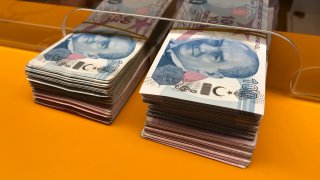
- Turkey's currency has lost more than 48% of its value in the last year as Erdogan pushed on with his policy of eschewing rate rises despite sky-high inflation.
- In its statement, the Turkish central bank's monetary policy committee also formally outlined its pursuit of "permanent liraisation" in all its foreign policy tools.
Turkey's lira dipped slightly in Thursday afternoon trading as its central bank chose to hold the key interest rate at 14%, in line with analysts' expectations. The announcement was preceded by Turkish President Recep Tayyip Erdogan vowing to "break the shackles of interest rates," despite inflation in the country hitting a 20-year high of 48.69% last month.
"The further rise in inflation to close to 50% y/y in January was clearly not enough to sway Turkey's central bank (and crucially, President Erdogan) to shift back to orthodoxy," Capital Economics' senior emerging markets economist Jason Tuvey wrote in an email note following the news. The central bank has cut the country's interest rate by 500 basis points since September.
The Turkish lira was trading at 13.6243 to the dollar at 4:30 p.m. in Istanbul.
Get San Diego local news, weather forecasts, sports and lifestyle stories to your inbox. Sign up for NBC San Diego newsletters.
Turkey's currency has lost more than 48% of its value in the last year as Erdogan pushed on with his policy of eschewing rate rises despite sky-high inflation. Turkey's foreign exchange reserves have been steadily dropping, and Turks earning salaries in lira are increasingly unable to afford basic goods as their prices soar. Steep hikes in electricity and natural gas tariffs have compounded the pain for consumers and businesses.
Erdogan on Thursday pledged to lower inflation to single digits. Capital Economics sees inflation remaining around 50% in the coming months and only dropping toward the end of 2022.
"Despite the worsening inflation backdrop, interest rate hikes remain off the cards as policymakers continue with the pursuit of their 'new economic model' of low interest rates and a weak lira," Tuvey wrote.
Money Report
In its statement, the Turkish central bank's monetary policy committee also formally outlined its pursuit of "permanent liraisation" in all its foreign policy tools.
"The Committee expects a disinflation process to start on the back of measures taken and decisively pursued for sustainable price and financial stability," the bank said.
The lira has held fairly steady around 13.5 per dollar in recent weeks, propped up by heavy central bank FX intervention. But many economists argue that the status quo isn't sustainable.
"Erdogan saying debate about interest rates has subsided — I totally disagree," Timothy Ash, emerging markets strategist at Bluebay Asset Management, wrote on Twitter. "The lira might have stabilised with massive FX intervention but that is short term fix. How can inflation fall with massively negative real interest rates?"
Earlier this month, Fitch downgraded Turkey's credit rating to B+ from BB- with a negative outlook. The rating agency wrote that: "Policy-driven financial stress episodes of higher frequency and intensity have increased Turkey's vulnerabilities in terms of high inflation, low external liquidity and weak policy credibility."
"Fitch does not expect the authorities' policy response to reduce inflation, including FX-protected deposits, targeted credit and capital flow measures, will sustainably ease macroeconomic and financial stability risks," it added.
The rate decision came just after Erdogan's first official visit to the United Arab Emirates in nearly a decade, during which he signed more than a dozen cooperation agreements with the oil-rich Gulf sheikhdom's leadership, which has pledged some $10 billion of investment into Turkey. The trip is seen to be part of a broader effort by the Turkish president to mend relations with Gulf Arab states, as well as Israel, after years of acrimony and distrust.
Analysts broadly expect the Turkish central bank's policy settings to stay unchanged in the coming months. "If anything," Capital Economics' Tuvey wrote, "political pressures mean that the next move in interest rates is more likely to be down than up ... as inflation should, barring another collapse in the lira, start to drop back towards the end of the year."






